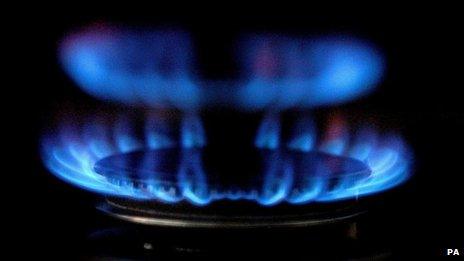Can the government limit further energy price rises?
- Published
- comments

I rang some well placed people in the energy industry to ask whether their companies would follow SSE by pushing up gas and electricity tariffs by 8% or so on average.
Now before I go on, note this is their voice not mine.
They say all the big players will have to push up power prices, but that the size and timing of the increases will be determined by the government.
What do they mean?
Well they say if you take an 8% increase as a benchmark for the industry, about three percentage points of that reflects what is happening to the wholesale price of gas and company overheads.
But the remaining five percentage points are determined by the government and regulator.
The regulatory cost is the charge imposed by National Grid to improve pipes and wires.
But the biggest chunk of incremental cost is what is described to me as "eco charges".
These are the government-imposed costs of insulating and cladding the homes of the poorest households, so that their energy consumption and costs fall over the long term.
Now the big energy companies are talking to ministers about extending the deadline for this scheme to help the most disadvantaged, and also introducing a bit more flexibility for the companies in determining who they should help (apparently it is proving complicated and expensive for the companies simply finding homes that qualify).
I am told Tory ministers are in favour of amending the eco charges so that pressure on the energy companies' costs are deferred, but the LibDems are standing firm on what they see as an important piece of redistribution from richer to poorer.
It is a tricky issue for the prime minister: stand firm on the eco charges and he risks alienating Tory voters; bend and he is vulnerable to the allegation that he is condemning the neediest to being unable to keep themselves warm.